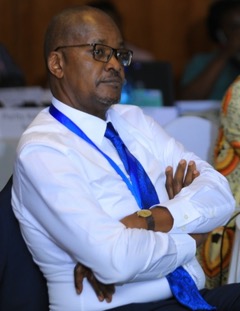CHRIS ABONG’O
 Dr. Abong’o is a diplomat by training. He holds a BSc (1983) and a Filosofi Kandidat (MPhil) (1992) in Econometrics from International Graduate School, Stockholm University, Sweden; an MA (International Studies) from the Institute of Diplomacy and International Studies, University of Nairobi; and a PhD in International Relations from Ecole Doctorale, SciencesPo, Michel Montesquieu, University, Bordeaux, IV, France.
Dr. Abong’o is a diplomat by training. He holds a BSc (1983) and a Filosofi Kandidat (MPhil) (1992) in Econometrics from International Graduate School, Stockholm University, Sweden; an MA (International Studies) from the Institute of Diplomacy and International Studies, University of Nairobi; and a PhD in International Relations from Ecole Doctorale, SciencesPo, Michel Montesquieu, University, Bordeaux, IV, France.
He has taught International Environmental Law and Policy and Environmental Diplomacy. Diplomacy, Public International Law, International Relations, Foreign Policy Analysis, International Development Law, and Bio-diplomacy (North-South Conflicts over Genetic Resources). He has a cumulative 27 years of teaching at the University of Nairobi, United States International University, and Jomo Kenyatta University of Agriculture and Technology (JKUAT). He has supervised 36 academic graduate students, including training civil servants on various aspects of diplomatic practice, governance, environmental, and natural resource management.
His diplomatic training enables him to handle problem definition, problem analysis, idea generation, action planning, and conflict resolution competently. In academia, he has researched on: “Kenya’s Environmental Diplomacy: A Critical Appraisal of Negotiations, Domestication of International Environmental Conventions and National Policy Implementation (1992-2008)” for a doctoral award; “Problems of Environmental Security in the IGAD Sub-region: A Reconceptualization of Environmental Conflict Management”; and “Bio-diplomacy: An Analysis and Synthesis of Environmental Conservation, International Peace and Sustainable Development” for his MA in International Studies. This MA opened up incisive analysis of the Convention on Biological Diversity, 1992, which was concluded in Nairobi in May 1992 and opened for signatures in June in Rio de Janeiro, Brazil.
His core skills and expertise include Environmental Economics Theory and Methodology, a member of the Environmental Economics Network of East and Southern Africa, and the Resource Accounting Network of Southern Africa (RANESA) since 2000. Chris has a long pedigree in varied consultancies on peace and security architecture in Africa, specifically focusing on the Horn of Africa. He has a sound grasp of development theories and a gift for research work. In July 2011, during the UNFCCC COP 17, he presented a paper: “Contextualizing Environmental Diplomacy: Opportunities and Challenges for Africa Durban COP 17” UNFCC/Institute for Global Dialogue/Friedrich Ebert Stiftung, Pretoria, South Africa, which laid a baseline for negotiations and fortified Africa’s position on Climate Change.
He possesses sharply honed international legal and policy analytical skills, having been a chief rapporteur at high-level meetings at the Intergovernmental Authority on Development (IGAD). He has 27 years of experience in varied consultancies and a sound grasp of development Theories and project implementation.
In 2011, during the run-up to South Sudan’s independence, he was the EU Technical Advisor on International Relations attached to the Ministry of Cabinet Affairs. He has also served as Diplomatic Training Advisor to South Sudan, seconded by the State Department of the USA and the International Executive Service Corps (IESC). He has carried out ex-ante, post-ante, thematic, joint, and summative historical evaluations and documentation for various organizations. He works with senior government officials at home, including former Heads of State (Eminent Persons).
Chris has led a team of five consultants in an IOM-led Joint Labour Migration Programme (JLMP) commissioned by a consortium of AU-ILO-IOM-UNECA, Addis Ababa, Ethiopia, investigating baseline assessment to identify existing needs and priorities in the area of labour migration management, including on the state of social dialogue in ECOWAS, EAC and SADC and selected Member States in each Regional Economic Commission (REC). He has served as a consultant on Peace Programs for the NCCK (2001), CJPC (2003), European Union (2010-2012), Freedom House (2013), and the Norwegian Church Aid in Sudan (2022). Norwegian Refugee Council (NRC) 2024. Below are some of his past publications:
Abong’o, C (2023). Deconstructing the Nexus between Climate Change and Migration in Kenya: Causes, Dynamics, Challenges and Opportunities. In Multiple Layers of Migration and the Horn of Africa: Security, Climate Change and Related Concerns. Jan Záhorík, Roselyn Omondi & Aleksi Ylonen, The Horn Institute and Konrad Adeauer Stiftung, Nairobi.
Abong’o, C (2011). ‘Contextualizing Durban 2011, UNFCC (COP 17) Negotiations on Climate Change: Challenges, Opportunities, and the Role of Environmental Diplomacy’. Paper prepared and presented at the Institute for Global Dialogue (IGD) and the Friedrich Ebert Stiftung (FES) Conference: COP 17: South Africa and the Road to 2011, held 4th-5th July, 2011, Pretoria, South Africa.
Abong’o, C (2010) ‘Kenya’s Environmental Diplomacy: A Critical Appraisal of Negotiations, and Domestication of International Environmental Conventions and National Policy Implementation (1992-2008)’. PhD in lnternational Relations, Ecole Doctorale, Michel Montesquieu Universite Boedeaux IV SciencesPo, France 2007 – 2010.
Abong’o, C (2008) “A Contextual Analysis of Environmental Diplomacy, Policy making and Practice”, Paper presented at workshop on Environmental Diplomacy and Human Security. Joint Foreign Service Institute (FSI), Nairobi and the Institute for Security Studies (ISS), Pretoria, 2008.
Abong’o C, (2002) “Ecological Sources of Conflict in the Horn of Africa, Friedrich Ebert Stiftung (FES), Addis Ababa, Ethiopia.
Abong’o C, (2000) “Environmental Issues in the Foreign Policy of African States: New Architecture or New Midwifery?”, Journal of Foreign Policy, Vol. 3, No. 1, 2000.
Abong’o, C (1999), “The Enoosupukia Water Catchment Conflict: An Analysis of the Interface between Environmental and Political Conflicts”
Abong’o C, (1997) ‘Bio-diplomacy: An Analysis and Synthesis of Environmental Conservation, International Peace and Sustainable Development’, M.A. Dissertation, Institute of Diplomacy and International Studies, University of Nairobi.



